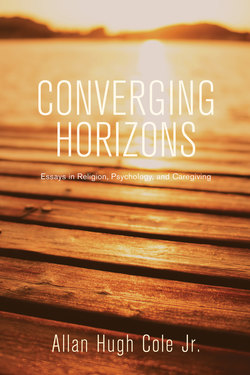Читать книгу Converging Horizons - Allan Hugh Cole - Страница 7
На сайте Литреса книга снята с продажи.
Foreword
ОглавлениеChristians live a narrative existence. All people do. We live by a set of stories carefully chosen from Scripture, tradition, and other sources. We often retell the history of Israel, the life, death, and resurrection of Jesus, or the ongoing work of the Holy Spirit. We imagine ourselves into those redemptive and creative stories and faithfully attempt to live into them. We also tell stories about our lives; about the joy and pain we know so intimately; about death and the sadness of broken relationships or lost dreams; about the trauma of abandonment and abuse. Being curious about one’s own story, the stories of others, and wondering how one’s story connects to the story of someone else or the stories in Scripture is a sign of maturity and certainly of excellence in leadership and caregiving.
One narrative that Christian care providers incarnate is found in 2 Corinthians 1. This “story” comes to us as a source of hope and as an imperative. Verse 3 identifies Jesus’ Father as “the Father of compassion and the God of all comfort.” This God, we are told, comforts us in all our troubles, “so that we can comfort those in any trouble with the comfort we ourselves receive from God” (NIV). It is grace to know that God is with us—God Emmanuel—in everything we experience. And what a privilege it is to be invited to be players and partners in God’s story of compassion! But also, what a challenge we face to be able to extend comfort to persons in “any trouble”! Like me, you may sometimes wonder whether this is actually humanly possible. Yet, this is the challenge a pastoral theologian or caregiver embraces to discover—that, with God’s help, it is possible.
To exude compassion through empathic and forgiving kindness and to provide comfort through restorative conversations—the essence of soul care—is not easily accomplished. We all know that boundaries continue to shift and traditions change rapidly amidst ever-increasing personal, interpersonal, and societal violence, with the concomitant emotional and relational fallout. Responding to these shifts or changes with violence, retreating into fundamentalism, or rigidly holding on to what once was does not lead to human flourishing. Soul care, as readers will discover, encourages a different approach. Seeing the whole person, in his or her entirety, in relationship to the living God, this care is a deep need in our world and the distinctive responsibility and task of being a pastoral caregiver.
Care providers, whether they embody compassion and comfort in congregations, schools, hospitals, or in consulting rooms and offices, and whether they are lay, ordained, or licensed, know that caregiving is a skillful art honed over time while immersed in theory, practice, and various healing, mentoring, and supervisory relationships. Converging Horizons: Essays in Religion, Psychology, and Caregiving is an important and transformational book for exactly this reason. In Allan Hugh Cole Jr. one finds a person who has practiced this art of soul care for many years and in different settings, always opening himself to being mentored and informed by theory. Moreover, he invites his readers on an exciting journey, empowering them to embrace the identity of being a pastoral theologian and a caregiver, someone who can weave together (converge) a common interest from divergent theories, knowledge, and envisioned outcomes (horizons) while facilitating healing and restoration. My own experience as a pastoral theologian and caregiver has taught me that this integrative act is difficult and requires something akin to having faith, and engaging in practices and ways of scholarship with a trust that a congruent whole, a restored person, a revitalized community, or new insights will be the result. Cole embodies such faith and those around him benefit from it. These essays also show how in one’s work, over time, common themes and conversation partners return, ever deepening and widening our practices, insights, and knowledge.
Most readers, I imagine, will identify with Cole’s transparent disclosure that he, like many pastoral theologians, is both unconventional and temperate (or traditional), or that being a pastoral theologian in the academy, the church, or society is not always easy. He echoes fellow pastoral theologian and dean, Michael Koppel, who writes that some leaders are “misfits”—“persons [with] qualities and experiences that do not correspond to dominant perspectives” (Koppel, 2008, 3). Misfit leaders, Koppel argues, are excellent leaders. We can add that misfit caregivers and pastoral theologians are exceptional caregivers and dynamic theologians! Drawing on theology, psychology, psychology of religion, psychodynamic and social theories, poetry and literature, as well as evidenced-based research, and by looking at religion, loss, mourning, melancholia, and mood disorders differently, Cole is a misfit—or as he puts it, prone to “misbehaving.” Of course, we are almost immune to messages of “misbehaving” as daily the media notifies us of yet another celebrity or role model that portrayed some form of antisocial or delinquent behavior. Cole has in mind another sort of “misbehaving.” One needs a pastoral theological imagination to see “misbehaving” as a trait worth cultivating in oneself and in future pastoral leaders and care providers.
Converging Horizons initiates those new to pastoral theology into a vibrant tradition with a long history and an identity that defies clear definition. It informs significant inquiry around loss and mourning, melancholia, identity, and male religion. The book instills confidence in being a caregiver that facilitates flourishing. It empowers narratives of restoration. Furthermore, the book challenges caregivers to recognize the intricate link between our relationships, our systems, our psychodynamic lives, and the ways we shape and engage our religions. It affirms the many misfit, misbehaving caregivers, unconventional yet temperate, working in churches, schools, social work agencies, hospitals, corporate buildings, and elsewhere. But mostly, Converging Horizons: Essays in Religion, Psychology, and Caregiving resituates pastoral theology as the discipline guarding the care of souls. Toward this task, Allan Cole is a recognized leader.
Jaco J. Hamman
Vanderbilt University
